#nejat i
Explore tagged Tumblr posts
Text
"Mesele sevmek değildir, kime sorsan seviyordur zaten. Mühim olan kırıp dökmeden, güzel sevebilmektir..."
-Nejat İşler
#sözler#kitap alintisi#kitaplar#books & libraries#geceye bir söz bırak#geceyebirsozbirak#geceyebiryara#geceye not#gecenin sözü#günün sözü#günün notu#bensarikaranfil#nejat işler#nejat i┼ƒler#klasikler#dünya klasikleri
2 notes
·
View notes
Note
so what kind of research into ancient mesopotamia did you do for this project?
A lot! I’d read the Epic of Gilgamesh before, but for this, I read parts of Daily Life in Ancient Mesopotamia by Karen Rhea Nemet-Nejat and Uruk: First City of the Ancient World by Nicola Crusemann, and my co-creator Sean D’souza read The Sumerians by Samuel Noah Kramer. Sean dived deep into the Sumerian language and came up with amazing names for people and cities.
I read several Sumerian myths. My favorite, hands down, is “Inanna’s Descent to the Nether World,” which you can find for free just by Googling it. It’s eerie and intense. Inanna is an amazing goddess in general.
Tangentially related, I also read Orientalism by Edward Said, to try to get a handle on the exoticism that pervades sword & sorcery fiction (and Romanticism, and so much else here in the West). That was a huge help in conceptualizing and building the setting.
And also I left a lot of room for invention! I want this to be “fantasy ancient Mesopotamia” the same way D&D or Warhammer is “fantasy medieval Europe.” A different template, a different vibe, but still a world where the players can enjoy open storytelling and world-building possibilities.
4 notes
·
View notes
Text
Ümit Sayin Ft. İzel - Tutun Ellerimden
🙏 🙏 🙏 🙏 🙏 🙏 🙏 🙏 🙏 🙏 🙏
Kadının delisi Makbuldur.
Deli gibi seveni,
deli gibi öpeni,
deli gibi içen,
İçine çekeni
Makbuldur i!!!! ,
Nejat IŞLER
youtube
3 notes
·
View notes
Text
İzmir’in dört bir yanında kültür var
https://pazaryerigundem.com/haber/222420/izmirin-dort-bir-yaninda-kultur-var/ -
İzmir’in dört bir yanında kültür var

İzmir Büyükşehir Belediyesi, mayıs ayında kentin farklı noktalarında pek çok etkinliğe ev sahipliği yapacak. Sergiler, konserler ve sinema gösterimlerinin yanı sıra Hıdrellez etkinlikleri İzmirlilere muhteşem bir yaza giriş dönemi yaşatacak.
İZMİR (İGFA) – İzmirliler, mayıs ayını birbirinden eğlenceli kültür sanat etkinlikleri ile karşılıyor. İzmir Büyükşehir Belediyesi Kültür ve Sosyal İşler Dairesi Başkanlığı organizasyonunda çok sayıda etkinlik yurttaşlarla buluşuyor. Sergiler ve sinema gösterimleri İzmirlileri sanata doyururken, Hıdrellez etkinlikleri ise eğlence ve coşkuyu doruğa çıkaracak.
Hıdrellez etkinlikleri, 5 Mayıs’ta Kültürpark çim alanda olacak. Etkinlik kapsamında 18.00’de İzmir Müzisyenler ve Sahne Sanatçıları Derneği, Lozan Kapısı bölümünde konser verecek. Kaskatlı Havuz’da ise İzmir Sahne Çalışanları Derneği 65 Yaş Roman Müzisyenler Konseri yine 18.00’de başlayacak.
Ana Sahne’de ise 19.00’da Çılgın Cemal ve Tepecik Müzisyenler Derneği var. Kopkop Mikrop, 20.00’de muhteşem bir performans sergileyecek. Saatler 21.00’i gösterdiğinde Ümmiye ve Türkiye Roman Orkestrası Konseri eğlenceyi doruğa taşıyacak. 22.30’da Atlas Pavyonu’nun yanındaki alanda geleneksel Hıdrellez ateşi yakılacak. Ateş etrafında ise Roman Ateşi Dans Grubu’nun performansı olacak.

Mayıs ayında kentin farklı noktalarında seminer ve sergiler yer alacak. Gizem Güngördü Ercengiz küratörlüğünde Çağın İçinden Çizginin Dışından karma sergi, Kültürpark Atlas Pavyonu’nda 23 Nisan-15 Haziran tarihleri ve 10.00-17.00 saatleri arasında ziyaret edilebilecek. Ahmet Piriştina Kent Arşivi ve Müzesi (APİKAM) ise 7 Nisan-2 Temmuz tarihleri arasında “Osmanlıca Seminerleri”ni tekrar düzenleyecek. Küratörlüğünü Aybala Yentürk ve Nejat Yentürk’ün, proje koordinatörlüğünü ise İzmir Büyükşehir Belediyesi Kent Arşivi ve Müzeler Şube Müdürü Dr. Serhan Kemal Saygı’nın yaptığı YANIK YURT – Kurtuluş Savaşı’nda İzmir ve Batı Anadolu Yangınları sergisi ise APİKAM’da 20 Haziran’a kadar ziyaretçilerini ağırlamaya devam edecek.
YENİDEN SİNEMATEK MAYIS PROGRAMI
İzmir Büyükşehir Belediyesi Yeniden Sinematek gösterimleri kapsamında 2014 yapımı Wim Wenders ve Juliano Ribeiro Salgado yönetmenliğindeki Toprağın Tuzu adlı belgesel film, 4 Mayıs günü izleyici ile buluşacak. 2023 yapımı Ryūsuke Hamaguchi yönetmenliğindeki Japon drama filmi Kötülük Diye Bir Şey Yok ise 11 Mayıs’ta gösterilecek. Semih Kaplanoğlu’nun yazıp yönettiği 2018 yapımı bilim kurgu türündeki siyah-beyaz sinema filmi Buğday 18 Mayıs tarihinde, yönetmenliği Gints Zilbalodis tarafından gerçekleştirilen 2024 yapımı bağımsız fantastik macera filmi Flow: Bir Kedinin Yolculuğu filmi de 25 Mayıs’ta beyaz perdeye yansıyacak. Tüm gösterimler 19.00’da İzmir Sanat Merkezi’nde olacak.

0 notes
Text
Çorbaya Benzeyen 8 Türk Celebrity

Bugünkü yazımımı bu ilginç konu üzerine yapmak istiyorum. Öncelikle bu inspirationı Bojack Horseman'daki Diane karakterinin Girl Croosh'ta çalışırken yazdığı yazılardan birinden aldım. Bir çorbayı anımsatan Türk ünlülerimizi düşündüm ve aşağıda da bunları sıralıyor olacağım. VIBESAL...
1- Yayla Çorbası - Mustafa Ceceli

Şu ikisine bile biraz bakınca insan zaten bi şeyleri anlıyor... Ne biliyim bunların ikisi aynı enerji işte yayla çorbasının da bu pürü pak ifadesinin altından ekşi bir yoğurt tadı nasıl çıkabilirse Mustafa Ceceli'nin de her an bir falsosu çıkabilir. Hatta çıkmış bile olabilir.
2- Mercimek Çorbası - Nejat İşler

Bunları nasıl matchlediğimi düşünecek olursam... Mercimek çorbası benim için biraz mecburiyet, bir sığınak ya da bir zorunluluğu temsil ediyor. Güvenli bir tercih evet, ama bunun yanı sıra aynı zamanda bu alanın dışına çıkacak cesaretimiz olmadığının bir göstergesi de olabilir mi? Belki de hepimizin dolabındaki ceset mercimek çorbası kadar ulaşılabilir kıldığımız Nejat İşler yapımlarıdır... Neyse ne, ona bu kadar maruz kalmak okul hayatımda ne kadar sık mercimeğe mecbur bırakıldığımı hatırlattı ondan sanırım.
3- Nohutlu Mantı Çorbası - Tuğba Büyüküstün

Açıkçası bu eşleştirmenin kendisi direkt zorlama kokuyor. Yani Tuğba Büyüküstün’ün bu büyük işlerine rağmen nasıl hala kendini öne atma ihtiyacı hissettiğini ve bu kadar zorlama olmayı kendinin mi seçtiğini…Yoksa tüm bu işler süresince de mi böyle biri olduğunu merak ediyorum. İşte bu merağımın aynısını nohutlu mantı çorbasına da taşıyorum. I mean yani mantı güzel bi şey, nohut da çok fanı olmasam da iyidir… Çorba da öyle. Ama biri neden üçünü de bir yemekte sunalım fikrini oluşturdu inanın anlayamıyorum çok gereksiz. Aynı Tuğba Büyüküstün’ün bizim için şuan en görünür iticiliklerinden biri olan Zeytin Ağacı galasında Seda Bakan’ı aşağı çekme çabası gibi. Yani bu çorba ne ve kime bu kadar üstünlük kurmak için kasmış anlayamıyorum abi… Ayrıca Tuğba sen de göründüğün gibi asil ve erişilemez vibeını korusaydın keşke.(Küçükken ortaokul çağlarında Cesur ve Güzel’deki karakterini izlediğimden beri ona hayranlık içersindeydim.
4- Beyran – Teoman

Bu çorbayı hiç içmiş bulunmadım fakat bu çorbanın genellikle bir hangover yiyeceği olarak tüketilmesi bile başlı başlına bir Teoman vibe yani. Artı olarak içerisinde kuzu barındırdığından gelen ağırlığını Teoman’ın herhangi bir röportajını okumanın zorluğunun verdiği ağırlıkla çok benzetiyorum. Yani bu kadar kendinden geçilmez be kanka kaç yaşına geldin… Teoman’ın bayık bakışlarını çorbanın yüzeyinde görmeye başladım bile. Ayrıca kendisi prefabrik tuvalet ve beyran çorbası tamlamalarını içeren tivitteki stereotipe de son derece uyuyor! Tıpkı hem çorbanın hem Teomanın isminin an ile bitmesi gibi. Hepsi tesadüf mü? Bilemeyiz.
5- Ezogelin Çorbası – Hazal Kaya

Öncelikle bi insanın canı neden ezogelin çorbası çeker…Sonralıkla bi insan eğer elinde güzel bir projesi varsa başrol olarak neden Hazal Kaya’yı seçer… Yani bilmiyorum tüm politik doğrucu görüşleri vesaire o bir duruşa sahip izlenimi bırakan karakteri başlarda bana geçse de günümüzde çok samimi gelemiyor. Ayrıca kendisinin özel hayatındaki kocasıyla olan ‘Mutsuz olduğumuz an evliliği bırakacağız, hayat çok kısa’ ya da ‘ Kocama yürümeye çalıştıklarında bunu çok tatlı buluyoruz’ açıklamaları gerçekten çok gereksiz ve kimsenin umrunda değil… Like napabiliriz yani gerçekten bi bu kalmıştı. Ezogelin de o kadar umrumda değil işte mecburiyetten içiyorum aynı zamanda bi şekilde kafamda bu ikisi eşlenik durumda.
6- Şifa (Yalancı İşkembe) Çorbası - Boran Kuzum

Bu adamın ünlü olması Türkiye açısından çok iyileştirici bi etkiye sahip oldu. İyi ki ünlüsün. Yani profilimizi sırtlanan isimlerden benim gözümde. Ayrıca clean görüntüsünün üzerindeki o çok yerindeki bıyık bu çorbanın üzerindeki o gezdirilmiş yağ gibi. İyi ki varsın..İyikimsin…
7- Tavuk Çorbası – Gülçin Ergül

Öncelikle yani bi aklınıza şu çorbayı getirin bi de Gülçin’i. Demek istediğimi anlayacaksınız. Tavuk çorbası benim için safe place tarzı bir önem taşıyor ve gerçekten çok seviyorum. Gülçin de Big5 izlemeye başladığımdan beri verdiği o safe, naif ve ulaşılabilir ve yargısız imajıyla beni kendine bağladı ve tavuk çorbasında bulduğum hislerimin çok benzerini ona da hissetmemi sağladı. Ayrıca gençliğinde de aşşşşırı hot ve çılgın bir piliç olması bunu ispatlar nitelikte!
8- Kremalı Mantar Çorbası – Kerimcan Durmaz

Bu çorbanın kesinlikle queer coded bi şey olduğunu düşünüyorum yani bence tüm kuir halk bu çorbayı severek tüketiyodur. Tw komünitesi falan böyle o tayfanın çok kollektif bilinçle sevdiği bi şey olarak görüyorum hep tıpkı o her hafta atılan salçalı makarna, bira yanında turşu tabağı gibi bi şey benim için ve bu çorba ünlü olsaydı Kerimcan olurdu. Gerçi onun son davranışlar da biraz şaibeli ama benim aklımda yer ettiği şekilde listem bu şekilde.
Liste bi şekilde yemekteyiz ünlüler kadrosu gibi falan bi şey oldu patladım çok kıymetli… Bundan sonra gerçekten bu yazma işini ajandama eklicem ve buna vakit ayırarak yazıcam. Önemli olmasa da… Mesela bundan sonraki yazımı yazmamı zorunlu kılmak için konusunu şimdiden buraya ekliyorum. Bir sonraki yazım -> Timelineımızı ele geçiren kitap : INTERMEZZO. O zamana kadar çokkkkkkkkhoscakalsın hepherkes

1 note
·
View note
Text
"It is not my place to argue with people and their dreams, but I am fairly certain that this is not how translation works. A great scholar of Persian and Urdu literature, Christopher Shackle, describes Ladinsky’s output as “not so much a paraphrase as a parody of the wondrously wrought style of the greatest master of Persian art-poetry.” Another critic, Murat Nemet-Nejat, described Ladinsky’s poems as what they are: original poems of Ladinsky masquerading as a “translation.”
[...] So yes, Ladinsky’s poetry is mystical. And it is great poetry. So good that it is listed on Good Reads as the wisdom of “Hafez of Shiraz.” The problem is, Hafez of Shiraz said nothing like that. Daniel Ladinsky of St Louis did.
[...]Ladinsky’s “translations” have been passed on by Oprah, the BBC, and others. Government officials have used them on occasions where they have wanted to include Persian speakers and Iranians. It is now part of the spiritual wisdom of the East shared in Western circles. Which is great for Ladinsky, but we are missing the chance to hear from the actual, real Hafez. And that is a shame.
[...] Hafez’s worldview is inseparable from the world of Medieval Islam, the genre of Persian love poetry, and more. And yet he is deliciously impossible to pin down. He is a mystic, though he pokes fun at ostentatious mystics. His own name is “he who has committed the Quran to heart”, yet he loathes religious hypocrisy. He shows his own piety while his poetry is filled with references to intoxication and wine that may be literal or may be symbolic. [...] Rumi (whose poetic output is in the tens of thousands) comes at you like you an ocean, pulling you in until you surrender to his mystical wave and are washed back to the ocean. Hafez, on the other hand, is like a luminous diamond, with each facet being a perfect cut. You cannot add or take away a word from his sonnets.
[...] Part of what is going on here is what we also see, to a lesser extent, with Rumi: the voice and genius of the Persian speaking, Muslim, mystical, sensual sage of Shiraz are usurped and erased, and taken over by a white American with no connection to Hafez’s Islam or Persian tradition. This is erasure and spiritual colonialism. Which is a shame, because Hafez’s poetry deserves to be read worldwide alongside Shakespeare and Toni Morrison, Tagore and Whitman, Pablo Neruda and the real Rumi, Tao Te Ching and the Gita, Mahmoud Darwish, and the like.
[...] A great scholar of Islam, the late Shahab Ahmed, referred to Hafez’s Divan as: “the most widely-copied, widely-circulated, widely-read, widely-memorized, widely-recited, widely-invoked, and widely-proverbialized book of poetry in Islamic history.” [...His] poetry is considered the very epitome of Persian in the Ghazal tradition.
[...] Hafez’s poetry has not been sitting idly on a shelf gathering dust. It has been, and continues to be, the lifeline of the poetic and religious imagination of tens of millions of human beings. Hafez has something to say, and to sing, to the whole world, but bypassing these tens of millions who have kept Hafez in their heart as Hafez kept the Quran in his heart is tantamount to erasure and appropriation.
[...] Oh, and one last thing: It is Haaaaafez, not Hafeeeeez. Please."
1 note
·
View note
Photo

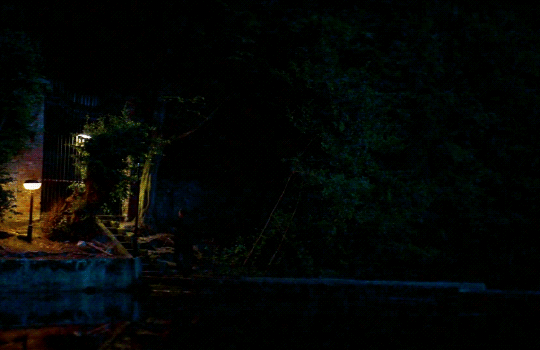
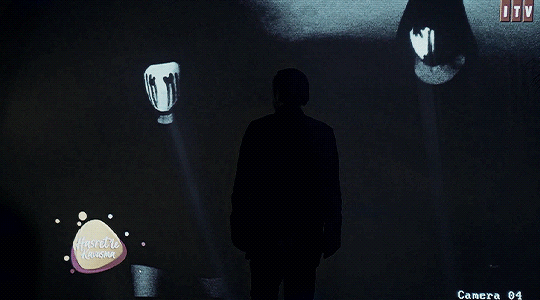




You are calling us killers, but we are not! We just want people to be fair and a fair legal system. And we are going to continue doing what we are doing as long as the laws do not protect women, children, and animals. We are going to continue because there is no justice in this country.
SAYGI ( 2020 – ) | 1x01 dir. by Ali Taner Baltaci
#saygı#dizi#turkishedit#turkishdreams#boran kuzum#miray daner#nejat isler#ercüment Çözer#savaş saygı#helen saygı#savaş x helen#mine*#so I started watching and so far so good!#miray and boran have crazy chemistry#and I love them
35 notes
·
View notes
Text
Günün her saati konuştuğun biriyle bir gün hiç bir şey konuşmayacaksın ve bu böyle devam edecek.
#sar?lma#olric#siyahkadaryalnizz#sehinsah#galata soka??#no.1#kaandogan#k?r?ld?m#platonik#nejat i?ler#sevgi sözleri#sevgi#sevgili#sevgisizlik#karşılıksız sevgi#aşk acıtır#aşk
225 notes
·
View notes
Photo








make me choose:
anonymous asked: suna doğan or ayşe yiğiter?
#benim tatlı yalanım#aslı bekiroğlu#suna doğan#turkishedit#btyedit#benim tatli yalanim#asli bekiroglu#of course i had to go with my baby girllll#LOOK AT THIS CUTIE#CANIM KIZIM BENİM#love her#make me choose meme#i was gonna put that quote nejat said about her at their wedding#but i got lazy lmao
49 notes
·
View notes
Text
Kendimi ‘böyle iyi’yi dinlemekten alıkoyamıyorum,
“Olmasa da olurmuş, atmasana Ziya!”
#no.1#can bozok#şanışer#şehinşah#rap#böyle iyi#olmasa da olur#nejat i?ler#galatasaray#yedi g?zel adam#currently reading#darwin#dog#çizim#leyla the band#teoman#leyla ile mecnun#erkin koray#barış arduç#cem karaca
37 notes
·
View notes
Text
Ö z l e m e k
erken saatlere alınsın,
sonra uykusuz kalıyor i n s a n ...
~♡ Nejat İşler

22 notes
·
View notes
Text
German language films I love (part 1)
In no particular order, except #1, because Good Bye Lenin is and always will be my favorite German film of all time.
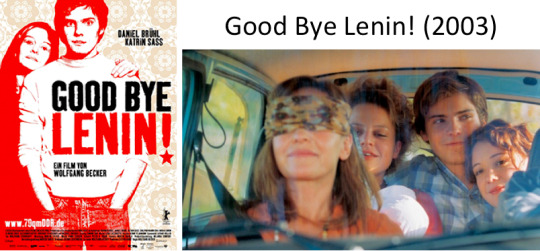
1) Good Bye Lenin!⎹ A family tragicomedy taking place in East Berlin that focuses on Alexander and his mother Christiane, who suffers a heart attack and goes into a coma for eight months. When she awakes in June 1990, she has no idea that the East German state she cherished no longer exists. To protect his now bed-ridden mother from the shock of current political events and societal changes, Alex decided to conceal the truth, and he and his family and friends go to great lengths to keep East Germany alive for her.
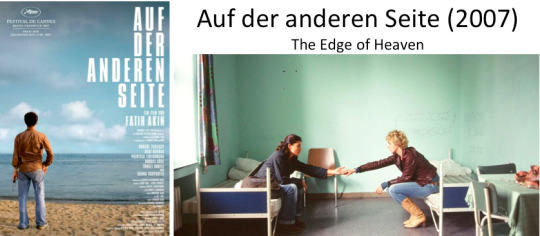
2) Auf der anderen Seite⎹ Two overlapping narratives and fates are explored - of university professor Nejat, who buys a bookstore in Istanbul, and anti-government resistance fighter Ayten, who flees from Istanbul to Germany and falls in love with Lotte. Favorite quote: Er sagte, er würde sich sogar Gott zum Feind machen, um mich zu beschützen (”He said he would even make an enemy of god to protect me”).
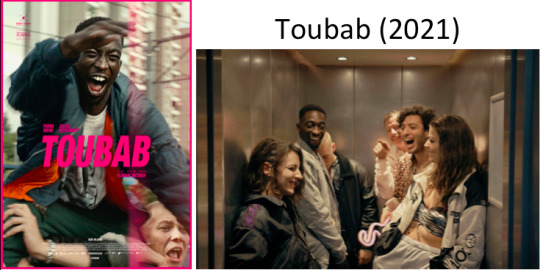
3) Toubab⎹ Right after being released from prison for a minor crime, Babtou is arrested once again and threatened with deportation, as he only has a Senegalses passport despite being born and raised in Germany. In an attempt to prevent deportation, Babtou scrambles to find a German woman to marry, and finally convinces his best friend Dennis to tie the knot with him. However, convincing the immigration authorities of the authenticity of their marriage proves to be a difficult task, even with the support of a new group of friends who welcome the pair into the queer community.
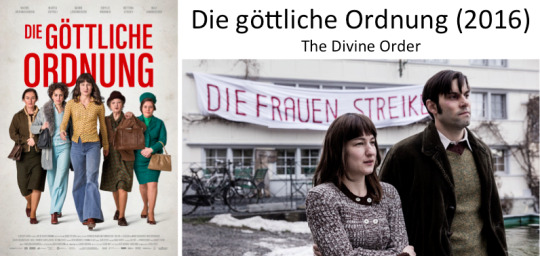
4) Die göttliche Ordnung⎹ This Swiss film (make sure to turn on German subtitles, as the characters speak Swiss German dialects) follows Nora, a housewife and mother, who against the wishes of her husband and community becomes involved in the Swiss women’s suffrage movement and organizes the women of her town to petition for the right to vote. (Yes, women could not vote in Switzerland until the 1970s... and it was not until 1990 that the right was granted to all women of the country.)

5) Der Tunnel⎹ A nail-biter until the end, this made-for-television film (running time is around 180 minutes) follows a group of East German deserters in 1961 who plan to dig a tunnel under the East-West Berlin border to get their loved ones out of the GDR. But spies, personal loss, and the inherent dangers involved in secretly building a tunnel threaten to foil their plans.
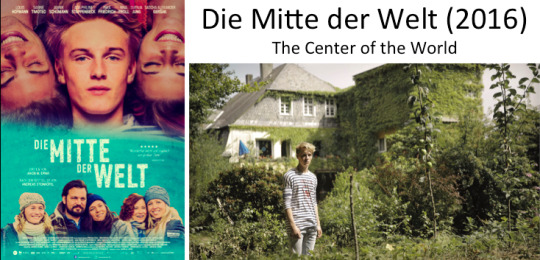
6) Die Mitte der Welt⎹ This is the film adaptation of the book of the same name by Andreas Steinhöfel, which I read as a teenager. It’s a coming-of-age story that centers on Phil, who lives in a German village with his eccentric and at times mentally unstable mother Glass and his twin sister Dianne. The family is mostly isolated from the other citizens of the village due to Glass’s antics. Phil notices his sister drifting away from him but is also preoccupied with a romance that has blossomed between him and a classmate, Nicholas, which is straining his friendship with best friend Kat.
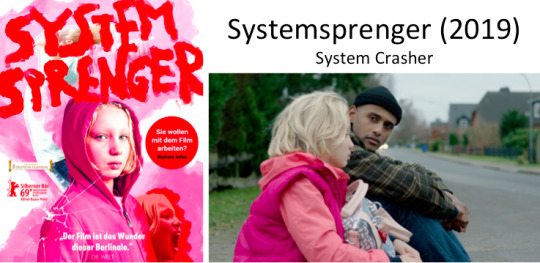
7) Systemsprenger⎹ Due to her violent outbursts, nine-year-old Benni is constantly being placed in and out of foster families and group homes. Efforts from social workers to help her work through her trauma backfire. Insanely talented young actress!
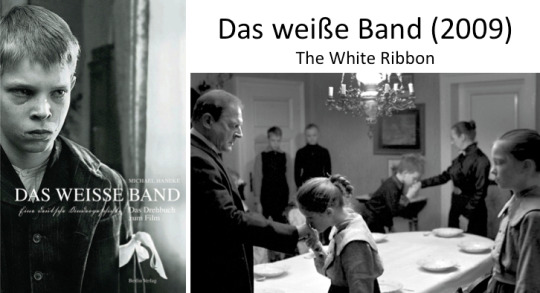
8) Das weiße Band⎹ Disturbing social drama and mystery that lays bare the violent foundations in an early 20th century German village. One day, a doctor falls off his horse after it trips over a wire strung between two trees. It is the first of many “pranks” that follow, seemingly without reason, all directed at the village’s upper class and growing increasingly more brutal. There are no suspects, but a local schoolteacher has his suspicions in the village’s children.
#i rewatched good bye lenin yesterday and was a sobbing mess at the end#which inspired me to think of other german language films i love#this list really is a mirror of my film taste#historical disturbing and queer#films#movies#german stuff
33 notes
·
View notes
Text
Some books for
"daily life of ancients and non"📚
As a history student I decided to make a list every week (mayybe?) of books that are historical (or not) and I find them interesting, so this is a list that includes the everyday life of ancient Greeks, Egyptians, Romans and natives. I hope you like it!🤍
Daily Life of the Ancient Greeks (The Greenwood Press Daily Life Through History Series) Greenwood Robert Garland
Daily Life in Ancient Rome: The People and the City at the Height of the Empire (A Peregrine Book Y23) Jerome Carcopino
Daily Life of the Ancient Egyptians Greenwood Bob Brier, Hoyt Hobbs
Daily Life and Demographics in Ancient Japan, University of Michigan Center for South and Southeast Asian Studies, William Wayne Farris
Daily Life of the Aztecs, 2nd Edition (The Greenwood Press Daily Life Through History Series), Greenwood, Davíd Carrasco, Scott Sessions
Daily Life in Ancient Mesopotamia, Nemet-Nejat K.R.
Daily life of the Inuit, Greenwood, Stern, Pamela R
#history#dark academia#ebooks#ancient history#ancient greeks#ancient japan#pdfs#<33#dark aurorae posts#dark acadamia aesthetic#books#booklover#booklr#reading
64 notes
·
View notes
Text
Fake Hafez: How a supreme Persian poet of love was erased | Religion | Al Jazeera
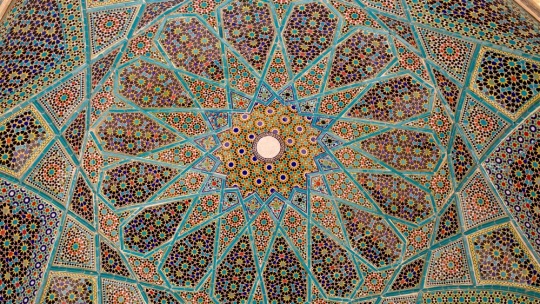
This is the time of the year where every day I get a handful of requests to track down the original, authentic versions of some famed Muslim poet, usually Hafez or Rumi. The requests start off the same way: "I am getting married next month, and my fiance and I wanted to celebrate our Muslim background, and we have always loved this poem by Hafez. Could you send us the original?" Or, "My daughter is graduating this month, and I know she loves this quote from Hafez. Can you send me the original so I can recite it to her at the ceremony we are holding for her?"
It is heartbreaking to have to write back time after time and say the words that bring disappointment: The poems that they have come to love so much and that are ubiquitous on the internet are forgeries. Fake. Made up. No relationship to the original poetry of the beloved and popular Hafez of Shiraz.
How did this come to be? How can it be that about 99.9 percent of the quotes and poems attributed to one the most popular and influential of all the Persian poets and Muslim sages ever, one who is seen as a member of the pantheon of "universal" spirituality on the internet are ... fake? It turns out that it is a fascinating story of Western exotification and appropriation of Muslim spirituality.
Let us take a look at some of these quotes attributed to Hafez:
Even after all this time, the sun never says to the earth, 'you owe me.' Look what happens with a love like that! It lights up the whole sky.
You like that one from Hafez? Too bad. Fake Hafez.
Your heart and my heart Are very very old friends.
Like that one from Hafez too? Also Fake Hafez.
Fear is the cheapest room in the house. I would like to see you living in better conditions.
Beautiful. Again, not Hafez.
And the next one you were going to ask about? Also fake. So where do all these fake Hafez quotes come from?
An American poet, named Daniel Ladinsky, has been publishing books under the name of the famed Persian poet Hafez for more than 20 years. These books have become bestsellers. You are likely to find them on the shelves of your local bookstore under the "Sufism" section, alongside books of Rumi, Khalil Gibran, Idries Shah, etc.
It hurts me to say this, because I know so many people love these "Hafez" translations. They are beautiful poetry in English, and do contain some profound wisdom. Yet if you love a tradition, you have to speak the truth: Ladinsky's translations have no earthly connection to what the historical Hafez of Shiraz, the 14th-century Persian sage, ever said.
He is making it up. Ladinsky himself admitted that they are not "translations", or "accurate", and in fact denied having any knowledge of Persian in his 1996 best-selling book, I Heard God Laughing. Ladinsky has another bestseller, The Subject Tonight Is Love.
Persians take poetry seriously. For many, it is their singular contribution to world civilisation: What the Greeks are to philosophy, Persians are to poetry. And in the great pantheon of Persian poetry where Hafez, Rumi, Saadi, 'Attar, Nezami, and Ferdowsi might be the immortals, there is perhaps none whose mastery of the Persian language is as refined as that of Hafez.
In the introduction to a recent book on Hafez, I said that Rumi (whose poetic output is in the tens of thousands) comes at you like you an ocean, pulling you in until you surrender to his mystical wave and are washed back to the ocean. Hafez, on the other hand, is like a luminous diamond, with each facet being a perfect cut. You cannot add or take away a word from his sonnets. So, pray tell, how is someone who admits that they do not know the language going to be translating the language?
Ladinsky is not translating from the Persian original of Hafez. And unlike some "versioners" (Coleman Barks is by far the most gifted here) who translate Rumi by taking the Victorian literal translations and rendering them into American free verse, Ladinsky's relationship with the text of Hafez's poetry is nonexistent. Ladinsky claims that Hafez appeared to him in a dream and handed him the English "translations" he is publishing:
"About six months into this work I had an astounding dream in which I saw Hafiz as an Infinite Fountaining Sun (I saw him as God), who sang hundreds of lines of his poetry to me in English, asking me to give that message to 'my artists and seekers'."
It is not my place to argue with people and their dreams, but I am fairly certain that this is not how translation works. A great scholar of Persian and Urdu literature, Christopher Shackle, describes Ladinsky's output as "not so much a paraphrase as a parody of the wondrously wrought style of the greatest master of Persian art-poetry." Another critic, Murat Nemet-Nejat, described Ladinsky's poems as what they are: original poems of Ladinsky masquerading as a "translation."
I want to give credit where credit is due: I do like Ladinsky's poetry. And they do contain mystical insights. Some of the statements that Ladinsky attributes to Hafez are, in fact, mystical truths that we hear from many different mystics. And he is indeed a gifted poet. See this line, for example:
I wish I could show you when you are lonely or in darkness the astonishing light of your own being.
That is good stuff. Powerful. And many mystics, including the 20th-century Sufi master Pir Vilayat, would cast his powerful glance at his students, stating that he would long for them to be able to see themselves and their own worth as he sees them. So yes, Ladinsky's poetry is mystical. And it is great poetry. So good that it is listed on Good Reads as the wisdom of "Hafez of Shiraz." The problem is, Hafez of Shiraz said nothing like that. Daniel Ladinsky of St Louis did.
The poems are indeed beautiful. They are just not ... Hafez. They are ... Hafez-ish? Hafez-esque? So many of us wish that Ladinsky had just published his work under his own name, rather than appropriating Hafez's.
Ladinsky's "translations" have been passed on by Oprah, the BBC, and others. Government officials have used them on occasions where they have wanted to include Persian speakers and Iranians. It is now part of the spiritual wisdom of the East shared in Western circles. Which is great for Ladinsky, but we are missing the chance to hear from the actual, real Hafez. And that is a shame.
So, who was the real Hafez (1315-1390)?
He was a Muslim, Persian-speaking sage whose collection of love poetry rivals only Mawlana Rumi in terms of its popularity and influence. Hafez's given name was Muhammad, and he was called Shams al-Din (The Sun of Religion). Hafez was his honorific because he had memorised the whole of the Quran. His poetry collection, the Divan, was referred to as Lesan al-Ghayb (the Tongue of the Unseen Realms).
A great scholar of Islam, the late Shahab Ahmed, referred to Hafez's Divan as: "the most widely-copied, widely-circulated, widely-read, widely-memorized, widely-recited, widely-invoked, and widely-proverbialized book of poetry in Islamic history." Even accounting for a slight debate, that gives some indication of his immense following. Hafez's poetry is considered the very epitome of Persian in the Ghazal tradition.
Hafez's worldview is inseparable from the world of Medieval Islam, the genre of Persian love poetry, and more. And yet he is deliciously impossible to pin down. He is a mystic, though he pokes fun at ostentatious mystics. His own name is "he who has committed the Quran to heart", yet he loathes religious hypocrisy. He shows his own piety while his poetry is filled with references to intoxication and wine that may be literal or may be symbolic.
The most sublime part of Hafez's poetry is its ambiguity. It is like a Rorschach psychological test in poetry. The mystics see it as a sign of their own yearning, and so do the wine-drinkers, and the anti-religious types. It is perhaps a futile exercise to impose one definitive meaning on Hafez. It would rob him of what makes him ... Hafez.
The tomb of Hafez in Shiraz, a magnificent city in Iran, is a popular pilgrimage site and the honeymoon destination of choice for many Iranian newlyweds. His poetry, alongside that of Rumi and Saadi, are main staples of vocalists in Iran to this day, including beautiful covers by leading maestros like Shahram Nazeri and Mohammadreza Shajarian.
Like many other Persian poets and mystics, the influence of Hafez extended far beyond contemporary Iran and can be felt wherever Persianate culture was a presence, including India and Pakistan, Central Asia, Afghanistan, and the Ottoman realms. Persian was the literary language par excellence from Bengal to Bosnia for almost a millennium, a reality that sadly has been buried under more recent nationalistic and linguistic barrages.
Part of what is going on here is what we also see, to a lesser extent, with Rumi: the voice and genius of the Persian speaking, Muslim, mystical, sensual sage of Shiraz are usurped and erased, and taken over by a white American with no connection to Hafez's Islam or Persian tradition. This is erasure and spiritual colonialism. Which is a shame, because Hafez's poetry deserves to be read worldwide alongside Shakespeare and Toni Morrison, Tagore and Whitman, Pablo Neruda and the real Rumi, Tao Te Ching and the Gita, Mahmoud Darwish, and the like.
In a 2013 interview, Ladinsky said of his poems published under the name of Hafez: "Is it Hafez or Danny? I don't know. Does it really matter?" I think it matters a great deal. There are larger issues of language, community, and power involved here.
It is not simply a matter of a translation dispute, nor of alternate models of translations. This is a matter of power, privilege and erasure. There is limited shelf space in any bookstore. Will we see the real Rumi, the real Hafez, or something appropriating their name? How did publishers publish books under the name of Hafez without having someone, anyone, with a modicum of familiarity check these purported translations against the original to see if there is a relationship? Was there anyone in the room when these decisions were made who was connected in a meaningful way to the communities who have lived through Hafez for centuries?
Hafez's poetry has not been sitting idly on a shelf gathering dust. It has been, and continues to be, the lifeline of the poetic and religious imagination of tens of millions of human beings. Hafez has something to say, and to sing, to the whole world, but bypassing these tens of millions who have kept Hafez in their heart as Hafez kept the Quran in his heart is tantamount to erasure and appropriation.
We live in an age where the president of the United States ran on an Islamophobic campaign of "Islam hates us" and establishing a cruel Muslim ban immediately upon taking office. As Edward Said and other theorists have reminded us, the world of culture is inseparable from the world of politics. So there is something sinister about keeping Muslims out of our borders while stealing their crown jewels and appropriating them not by translating them but simply as decor for poetry that bears no relationship to the original. Without equating the two, the dynamic here is reminiscent of white America's endless fascination with Black culture and music while continuing to perpetuate systems and institutions that leave Black folk unable to breathe.
There is one last element: It is indeed an act of violence to take the Islam out of Rumi and Hafez, as Ladinsky has done. It is another thing to take Rumi and Hafez out of Islam. That is a separate matter, and a mandate for Muslims to reimagine a faith that is steeped in the world of poetry, nuance, mercy, love, spirit, and beauty. Far from merely being content to criticise those who appropriate Muslim sages and erase Muslims' own presence in their legacy, it is also up to us to reimagine Islam where figures like Rumi and Hafez are central voices. This has been part of what many of feel called to, and are pursuing through initiatives like Illuminated Courses.
Oh, and one last thing: It is Haaaaafez, not Hafeeeeez. Please.
The views expressed in this article are the author's own and do not necessarily reflect Al Jazeera's editorial stance.
This content was originally published here.
241 notes
·
View notes
Note
Ben hergün 4 5 çikolata yiyorum 45 kgyim ama dar omuzlu kolları tığ gibi rüzgar olsa uçacak olanlardan değilim bacaklarım kalın popom büyük tatlı kum saati vücuda destek oluyor bence östrojen hormonu salgılamaya yardımcı
Avrupalıların yaşam tarzı da budur bu arada çok yiyip çok spor yapmak her evin altında spor salonu vardı nerdeyse
Peki nejat senin tatlıyla aran nasıl sende tam hiç tatlı aburcubur yemez şekerden uzak biri vibe i alıyorum
tatli severim taze ve güzel yapılmışsa.. abur cubur ve meyve cok tüketmiyorum sanırım
4 notes
·
View notes
Text
" Üzerime bir enkaz bırakmış , bir tozu üfledi diye affetmişim.."
#al?nt?lar#?ark? s?zleri#beklentileruzer#biriyimbenbiri#t?rkce rap#g?zel s?zler#sar?lmak#morbirbulut#emre ayd?n#no.1#k?r?ld?m#siyahkadarsonsuz#sebnemferah#sevmek#o?uz atay#ge?mi?#edebiyat#sebahattin ali#t?rk rap#nejat i?ler
31 notes
·
View notes